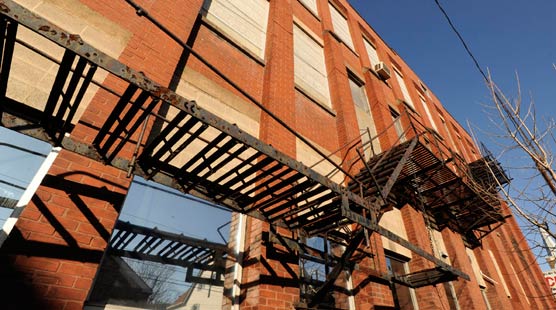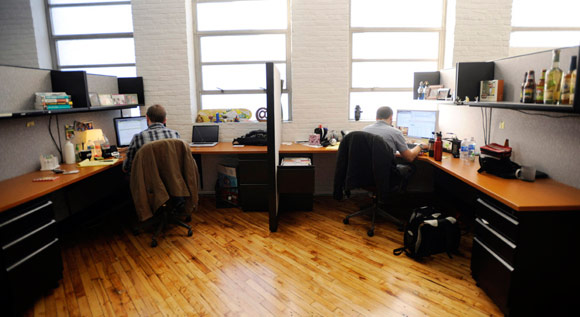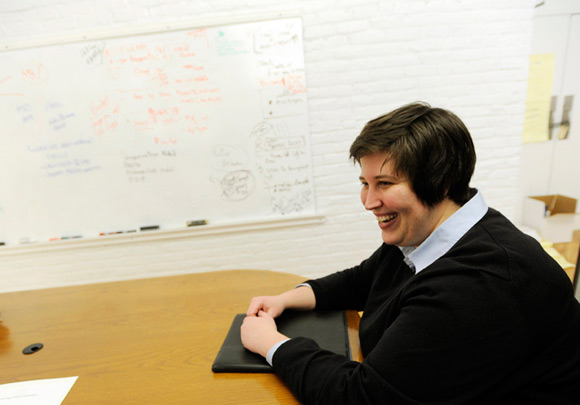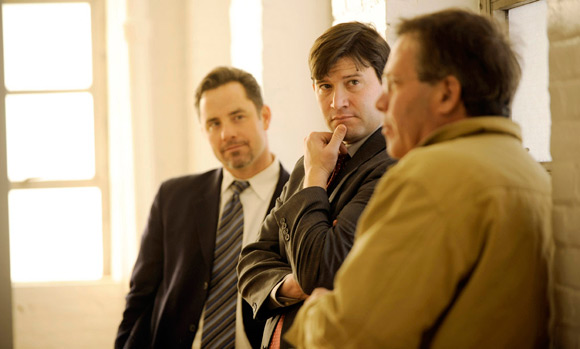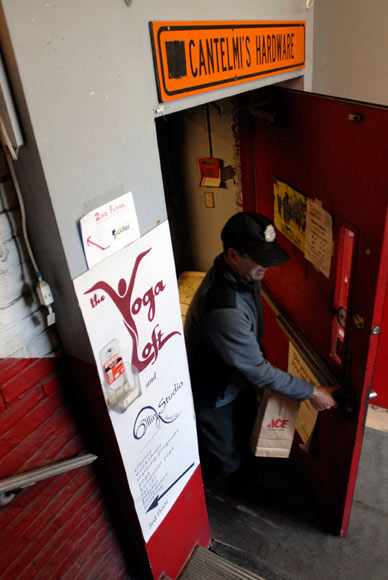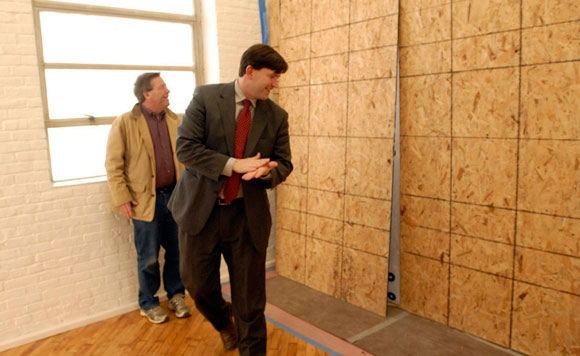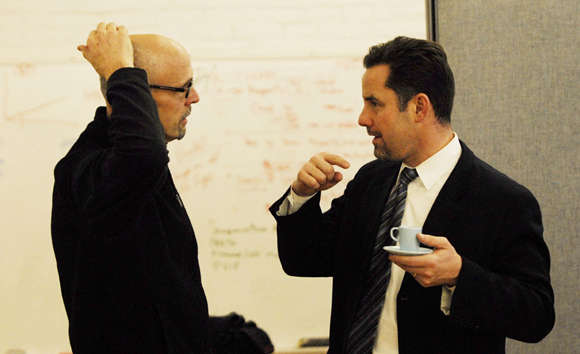The average person – even the average person who lives in Bethlehem – doesn't consider the Lehigh Valley city as a hub of tech startups.
“People think of Bethlehem as a colonial city, as a historical city, as a steel town,” Mayor John Callahan says. “We have been and are a technology city.”
While the industrial giant Bethlehem Steel is now gone, a host of new businesses have opened up in Bethlehem over the past several years. They include startups in the life sciences, software, nanotechnology, alternative energy and more. One of the city's challenges has been finding room for all the entrepreneurs who wanted to move in.
Through a series of studies of transportation and business opportunities in Bethlehem, it became clear about four years ago that new businesses would create a demand for more offices downtown – not removed from the city in some office park.
“The entrepreneurial community in particular, they want to be able to get a slice of pizza at 11 at night,” says Steve Melnick, director of the Southside Bethlehem Keystone Innovation Zone. “They want to be able to go out and go for a run.”
One solution came from of OraSure Technologies and IQE, two companies that grew up in technology centers built at the former Bethlehem Steel site. OraSure, a medical device firm, became so successful that it bought its building in 2006. Semiconductor company IQE did so the next year. Those sales netted the city $1 million.
About two years ago the search began for more office space for startups in the 30-block innovation zone in Bethlehem's business district. City officials wanted a place with about 10,000 square feet available, plus on-site parking.
So in the summer of 2010, they approached Richard Cantelmi, owner a three-story former silk blouse mill downtown. He runs the family-operated hardware store on the first floor and had rented the other two floors to a host of businesses. Leasing the second floor to the Bethlehem Economic Development Corp. would give him a stable tenant. (The former mill's third floor is home to a yoga studio.) Cantelmi and the city agreed that the second floor would be Bethlehem's next technology center, called Pi.
Partnership for Innovation
The name “Pi” comes from the facility's formal name, Partnership for Innovation. Plus, adds city enterprise zone coordinator Bekah Rusnock, pi is an accessible mathematical concept that could communicate the fact that Bethlehem has a bustling high-tech sector.
“The general public doesn't realize that there are a lot of tech companies in Bethlehem,” Rusnock says.
Pi's 8,000 square feet have a modern, industrial vibe. Century-old brick walls and tall windows combine with transparent office dividers and exposed pipes. Shared amenities include a kitchenette, conference room and copy machine. Besides that, tenants can take advantage of three 36-foot-square “conversation rooms” just big enough for a phone call or informal meeting between two colleagues. One restroom has a shower where workers can bathe after riding their bikes to work or clearing their heads with a run on a nearby railroad track that's been converted to a jogging trail – another result of studies by the innovation zone.
Entrepreneurs can take advantage of research facilities at Northampton Community College and Lehigh University. In fact, two of Pi's tenants are startups run by Lehigh faculty.
Rehabbing the building cost about $700,000 from the sale of the IQE and OraSure buildings. That leaves about $300,000 which will be available for projects like façade improvements to buildings in certain parts of the city.
The first businesses moved into Pi in October. Now there are seven, including three graduates from a Ben Franklin Technology Partners incubator at Lehigh. The tenants include developers of high-tech products, software firms and a packaging company. Each has a one-year lease.
The offices filled up quickly. Callahan explains that the city wanted to rent them to businesses that complemented each other rather than being too similar. Demand for Pi was so high that the city and innovation zone are in the first stages of searching for a building that could become home to something similar.
A transitional home
Findings from city and innovation zone administrators showed that space for companies that weren't brand new, but were still in startup mode, would be well received. “I kind of refer to them as halfway houses,” Melnick says. “They come out of the incubator but can't afford market rates.”
If being housed in a traditional business incubator is like being in elementary school, Rusnock says, Pi is more like middle school. The facility doesn't have its own support staff. Rent includes expenses such as electricity, parking and use of the kitchenette. Tenants pay their rent to the Bethlehem Economic Development Corp., which in turn pays Cantelmi and his wife Rosemarie for use of the second floor.
Free rent in the remaining empty office is part of the grand prize in an innovation zone contest. Early-stage businesses in sectors like advanced materials, life sciences and financial services are invited to enter the competition, which will also award cash prizes and free consultations with a lawyer and accountant. The deadline is Feb. 28.
Viddler, an online video hosting site that grew out of a Lehigh class project, opened its Pi office in October. The company employs about 20 people, half of whom work virtually.
“It's a very cool space,” VP Donna DeMarco says. “We walk to lunch. We use the greenway out back to go running at lunch.”
Viddler emerged from the Ben Franklin incubator and wanted to stay in Bethlehem's Keystone Innovation Zone for the tax benefits that came with that location. And the region has generally been good to the company, so much that DeMarco can see Viddler doubling its workforce while renting space at Pi.
“We've done amazingly well hiring local tech talent,” she says, adding that the Lehigh Valley is an under-the-radar home of skilled people to fill her job openings. “You don't get a huge quantity of resumes, but quite a few high-quality resumes.”
The creation of Pi was part of Bethlehem's push to keep companies like Viddler in the city. The idea is that while they are housed at Pi, these businesses will grow to the point that they will eventually find new, larger offices – ideally in Bethlehem. The space they vacate can go to other early-stage businesses, perhaps graduates of incubators like the one run by Ben Franklin.
“We want to keep them here to the extent that we can,” Callahan says.
REBECCA VANDERMEULEN is a freelance writer who lives near Downingtown. As she tells friends out of state, that's between the cheesesteaks and the Amish.
PHOTOS:
The Pi office space in downtown Bethlehem
The renovated Pi office space
Bekah Rusnock
Mayor John Callahan, left; Director of Community and Economic Development for Bethlehem CityJoe Kelly, center, assists Richard Cantelmi, right
Businesses filling up Pi office space
Pi office
Kelly, right, assists Cantelmi, left, with resetting a wall inside Pi
Callahan , right and President of Viddler.com Tom Stine in the Viddler.com renovated space at the Pi complex.
All photographs by BRAD BOWER
